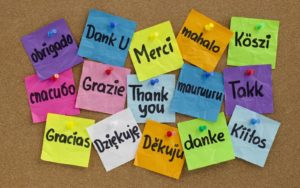The uproar about that New York lawyer going postal because people were speaking Spanish at a Fresh Kitchen eatery has reminded me how lucky I was to grow up in a multi-lingual home.
Before World War II hit his tiny village in Czechoslovakia, my father knew Yiddish, Hungarian, Czech, Russian, Ukrainian, and Ruthenian. He learned German during the war, and also Rumanian. Far to the north in Vilnius, my mother’s household languages were Yiddish, Polish and Russian, and she studied German and French in school. Latin, too, which benefited me as a kid because she was able to explain grammar simply and clearly. When they lived in bi-lingual Brussels after WW II, my father picked up Flemish.
I myself was bilingual before kindergarten: I spoke Yiddish and English at home, and even though over time I stopped using Yiddish with my parents, I still understood it. In fourth grade, my class started learning French, which I loved and took to so well that down the road I become my high school’s star French student.
When a German publisher bought three books of mine back in the 2000s, I started taking German classes and reached a point where I could introduce a reading in German on a book tour and even do the reading itself in German.
 Not too long ago, a senior colleague at Michigan State University asked if I’d like to join him in launching a summer program in Sweden. I didn’t hesitate. Part of the attraction was getting to study Swedish, a language I quickly fell in love with for its musicality and relative simplicity compared to German. That program didn’t pan out because of issues with the Swedish university, but the time I spent immersed in Swedish language study was tremendous fun. When you study a language, you also learn about the country’s culture and history and until then, I’d known very little about Sweden. I was fascinated by many things, including their notion of lagom: having just enough in life.
Not too long ago, a senior colleague at Michigan State University asked if I’d like to join him in launching a summer program in Sweden. I didn’t hesitate. Part of the attraction was getting to study Swedish, a language I quickly fell in love with for its musicality and relative simplicity compared to German. That program didn’t pan out because of issues with the Swedish university, but the time I spent immersed in Swedish language study was tremendous fun. When you study a language, you also learn about the country’s culture and history and until then, I’d known very little about Sweden. I was fascinated by many things, including their notion of lagom: having just enough in life.
I moved on to Dutch more recently when I created a summer abroad program of my own based in Ghent, Belgium. I made fairly good progress until it was kiboshed by a department chair despite the enthusiastic approval of administrators above her level who were eager for something new and exciting. I don’t regret the time devoted to it. Dutch isn’t easy, but it’s been fun and I know on my next trip to Amsterdam or anywhere in Flanders that I’ll be able to interact with people without feeling stuck in my own skin.
French has helped me in my travels across Europe and even, surprisingly, in Israel; ditto German outside of Germany. I’ve read books in both languages that have inspired me as a writer. A shop owner in Paris once said to me–after complimenting my French–that you can’t really understand another culture until you enter its language.
I’m grateful to the many fine language teachers I’ve had over the years for opening those doors. They’ve made my travels infinitely more enjoyable, they’ve given my deeper access to the countries where I spoke that language, and they’ve connected me to my past.
Lev Raphael is the best-selling author of a guide to the writing life, Writer’s Block is Bunk, and 24 other books in genres from memoir to mystery. You can study creative writing with him online at writewithoutborders.com
